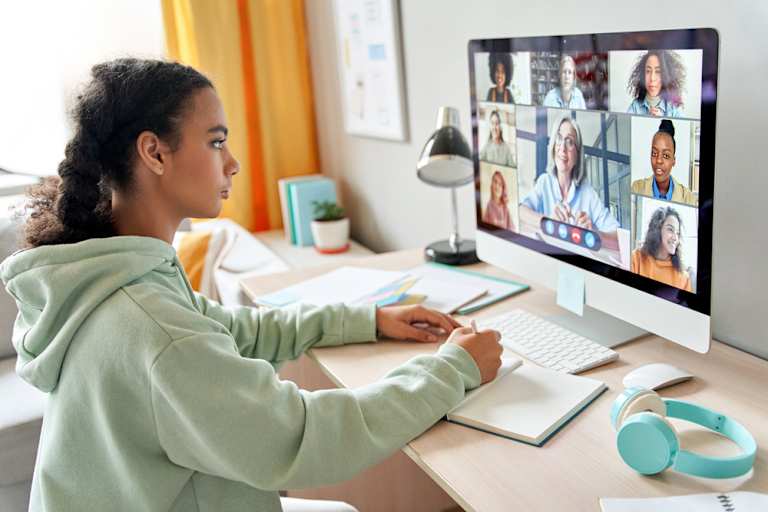How to Choose a Laptop for College
- When buying a laptop for college, be sure to consider factors like RAM, battery life, and price.
- Students who prioritize flexibility and portability may prefer a 2-in-1 laptop.
- Several computer manufacturers offer special college student laptop deals and discounts.
Every student needs a laptop for college, but unlike inexpensive school supplies, such as pens and paper, laptops are long-term investments. Spending some time researching laptops can help you figure out what type of device will work best for your courses and what you can afford.
In this guide, we outline the major factors to consider when looking at laptops for college. We’ll also discuss financing options and how to find the best college student laptop deals.
What Is a Good Laptop for College?
The average student spends close to 75% of their time engaging with technology, so it’s important that you feel comfortable while working on your laptop. All students should consider the following eight factors before choosing a laptop for college.
Traditional vs. 2-in-1 Laptop: Which Is Better?
By combining the features of a laptop and a tablet, 2-in-1 devices offer distinct advantages over traditional laptops. These laptops feature two main designs, using either a detachable keyboard or a rotating hinge that allows you to fold the keyboard behind the screen.
The versatility of a 2-in-1 device offers some obvious advantages. College students might use the device as a traditional laptop for taking notes during class and then switch to its tablet mode to read a digital textbook for homework. For those who travel frequently or often complete assignments on the go, a compact 2-in-1 laptop can offer greater portability and flexibility.
These versatile features, however, tend to come at a higher price than traditional laptops. Also, 2-in-1 devices may feature lower-end hardware due to their reduced size and increased flexibility. Keep these factors in mind before deciding whether a traditional or 2-in-1 laptop is right for you.
4 Tips for Saving Money on a Laptop for College
1. See Whether Your School Offers Any Discounts or Programs
Given the essential role technology plays in modern education, many colleges now provide inexpensive or free laptops for college students. Some schools may include laptops in the cost of tuition, while others may offer them completely free of charge. Certain colleges may also lease laptops to students for the duration of their program, with some allowing learners to keep their laptops after graduation.
Not all colleges provide laptops, so check with the admissions departments to determine what type of technology accommodations your school offers.
2. Look for College Student Laptop Deals
Several computer manufacturers and tech stores offer special discounts and financing options for college students. Some schools may even negotiate pricing and payment options for learners. As with any offer, be sure you read the fine print and understand the total cost before signing.
The following companies offer some of the best college student laptop deals:
- Microsoft: Student deals at Microsoft include 10% discounts on Surface series laptops and machines with Microsoft Office 365 at no extra charge. Microsoft sells numerous inexpensive, student-friendly laptops.
- Apple: Apple offers several popular products at reduced prices for learners, including MacBook laptops, iMac desktops, and iPad tablets. Students who trade in eligible Apple devices can also receive credits toward a new MacBook.
- Dell: Dell’s student discounts include $100 off special education computers and 10% off high-performing laptops. Certain PCs also offer special expedited shipping for students who need a computer straight away.
- Lenovo: Lenovo provides discounts to students, teachers, and school administrators. ThinkPad laptops and other devices qualify for these discounts, and all orders include free shipping.
- Best Buy: Best Buy offers rotating deals on computers and other home electronics products. Discounts may provide significant savings on select laptops and tablets, as well as certain mice, keyboards, and headphones.
3. Consider Leasing
College students can lease or rent laptops until they’ve paid their full value, at which point they assume ownership. These leases often resemble car or house payments, charging interest in addition to the property’s value. Expect to pay off your laptop’s full value within about two years.
Some companies offer a same-as-cash clause, which allows those who are leasing to avoid interest charges if they pay the amount due within a specified time frame. If you’re confident you can meet this deadline, this could make for a solid short-term solution.
Without a same-as-cash clause — or if you fail to pay the loan on time — high interest rates can kick in. Paying exorbitant “convenience” charges can quickly add up to more than the laptop is worth, so approach these vendors with caution.
4. Use a Third-Party Website
The open market offers tons of opportunities for low-cost computers, and many college students conclude their searches by buying a laptop off sites like eBay and Craigslist. Learners should exercise caution in these situations, though, as most third-party sites conduct little to no policing of their vendors.
Before you begin your search, identify the most important features you’re looking for in a laptop for school. Then, build awareness of typical market pricing or resale value on particular models. Finally, exercise the utmost care when buying from individuals on these sites.
Additional Resources for College Students
Explore More College Resources

Summer Semester: When Does It Start? And Should You Enroll?
School’s out — or, rather, in — for summer. Discover the pros and cons of enrolling in an optional summer semester in college.

by Anne Dennon
Updated March 20, 2023



